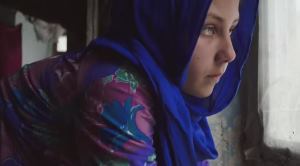Berlin: Yosef Baraki’s road to Kabul for Mina Walking

The way Yosef Baraki tells it, a close encounter with an Afghan-Taliban firefight in Kabul while shooting his debut feature Mina Walking was more worrying for the young Canadian director than for his local cast and crew.
Baraki and his team were in a Kabul fortress and about to roll the cameras on a scene in which his film’s strong young female protagonist, Mina, is to run to a tank to deliver a package. Suddenly, the approaching sound of distant mortar rounds rang out.
“I could hear boom, boom, boom. It was far off, but every second the sound felt nearer and near,” Baraki said of the fired shots from the Taliban landing at the nearby Kabul airport. “We couldn’t get clear sound, so we stopped [production] and no one moved, and we didn’t leave. I asked the crew if this is normal and they said yes.”
Also remaining still and calm was 12-year-old Farzana Nawabi, who plays the young female lead in Mina Walking, which had its world premiere at the Berlin Film Festival in the Generation sidebar.
“[Farzana] didn’t hide. She was waiting, undisturbed. It’s a daily occurrence, she told me,” Baraki recalled.
His film portrays Mina trying to stay in school and avoid a life as a Kabul street seller as she struggles to care for her father, a useless junkie, and her senile grandfather after her mother was killed by the Taliban.
Mina’s decision to educate herself rather than look after her grandfather unleashes events that change her life forever.
Mina Walking is produced by Baraki Films, a Toronto indie prodco formed by producer Andrew Korogyi and Baraki, who earlier collaborated on Yosef’s short film Der Kandidat, about a mother attempting to save her son from the horrors of Nazi eugenics.
Baraki’s first feature was shot over 19 days in Kabul with a hand-held camera after being structured as a Canada-Afghanistan coproduction.
The Afghan Ministry of Culture helped production on Mina Walking by supplying camera equipment, and giving Baraki a crew of five young students from a local Kabul film school.
Also supporting Baraki with is debut feature was Siddiq Barmak, the veteran Afghan director (Osama), who helped cast Nawabi, coach her in the lead role, while acting as a go-between the young Canadian director and the Afghan government.
That help was needed for the low-budget Canadian indie.
“Because we were such a small crew, we were shooting [Mina Walking] guerrilla style. Once we went out on our own with a van and our five people crew, we were cut off,” Baraki remembered.
The Kabul shoot faced more danger than just far-off shelling by the Taliban.
Baraki often had to shoot scenes from a roof-top, or an overhead office window, to avoid alerting locals suspicious of video cameras after that country’s long conflict.
On occasion, locals would rain down abuse on Nawabi for appearing in a movie.
“When we were filming in busy streets or markets and people saw me pointing a camera at her (Nawabi), they would yell out insults, they would throw things at her and shout she should be ashamed to play in a film, she should be at home, not on the street talking to boys,” Baraki recalled.
The young director hopes to return to Kabul to shoot an updated movie about his Mina character, one where she is a teen.
But Baraki, whose family emigrated to Canada from Afghanistan, doesn’t expect that country’s political and religious troubles to end anytime soon.
“If I went there in a year’s time, I think that things wouldn’t change. I don’t know that things would get worse. But people have suffered from decades of war,” he said.

 The definitive CDN broadcast and production resource.
The definitive CDN broadcast and production resource.










